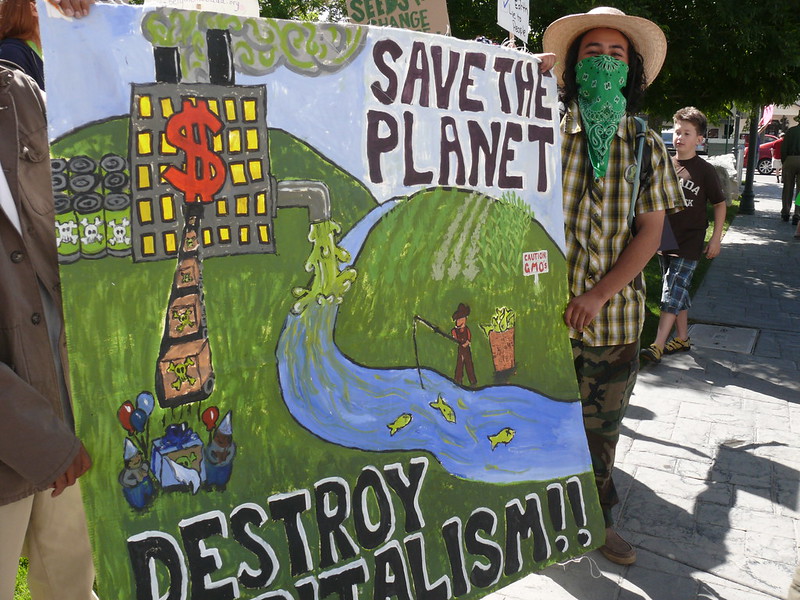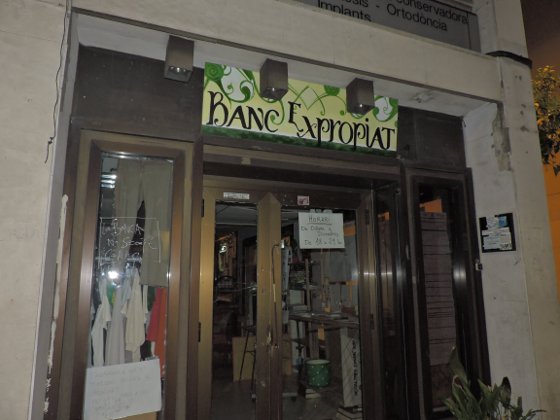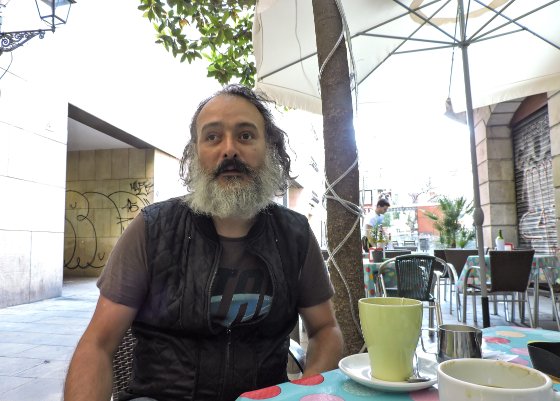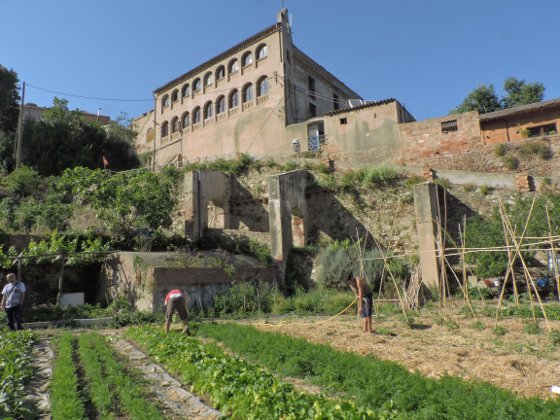
by Riccardo Mastini
Over the past year the Green New Deal banner has been appropriated by so many different movements and political parties that it is difficult to agree on what it actually stands for. However, in its most radical articulations (such as the one presented in the book A Planet To Win) Green New Deal advocates prescribe the need for an active role of the State in the economy. In doing so, they heed Keynes’ advise formulated in the 1926 essay The end of laissez-faire: “The important thing for government is not to do things which individuals are doing already, and to do them a little better or a little worse; but to do those things which at present are not done at all.” This means moving beyond market-based environmental policy instruments (e.g. tax incentives and price signals) and fully embracing command and control regulation. Deploying the power of public investment and coordination is a historic break from the neoliberal dogma that has reigned over the world for the past 30 years. Thus, the Green New Deal is undoubtedly a step in the right direction.
A truly transformative Green New Deal cannot simply be about returning to a welfare capitalist order of days of yore. It must move beyond capitalism’s growth imperative.
However, I argue that the vision sketched out above is inadequate to deal with the current ecological emergency. A truly transformative Green New Deal cannot simply be about returning to a welfare capitalist order of days of yore. It must move beyond capitalism’s growth imperative. This is not only because there is no empirical evidence supporting the existence of a decoupling of economic growth from environmental pressures anywhere near the scale needed to deal with the ecological crisis, but also because such decoupling appears unlikely to happen in the future. At least in affluent countries, therefore, a downscaling of production and consumption should be in order. But to ensure social well-being and equality in the face of a contracting economy, we need to develop a suite of post-growth policies.
Decreasing energy and material use
There is clear evidence that the deployment of renewable energy is insufficient on its own to displace fossil fuels in energy production. Historically, new energy sources have added more energy without removing older sources. The average trend in many nations around the world over the past 50 years shows that each unit of electricity generated by non fossil-fuel sources displaced less than one-tenth of a unit of fossil-fuel-generated electricity. What is, therefore, needed is a gradually declining cap on carbon emissions that a country is allowed to generate in line with its international commitments. This mechanism should be coupled with additional policies to equitably distribute the remaining national carbon budget across society and reduce energy poverty. To this end, we could think of adopting a system of carbon quotas.
Decarbonizing the energy system can be further facilitated by scaling down aggregate energy use. For instance, a recent study published in the journal Nature shows that successfully reducing emissions has historically required reductions in energy demand, which in turn was caused by a lesser growth in GDP. The objective of reducing energy use can also be pursued by decreasing material throughput since material extraction and consumption are major drivers of energy demand. This approach to reducing material throughput has the added benefit of releasing pressure on ecosystems. Post-growth policies that go in this direction include, for example, legislation for longer-lasting products, banning planned obsolescence, introducing right to repair, mandatory recyclability, mandatory long-term warranties, etc.
The decarbonization of these basic services should entail their decommodification: removing them from the market logic and subjecting them to the logic of the commons.
Decommodifying basic services
Climate change is class struggle as it forces us to rethink the material conditions of everyday life: how we move, what we eat, how we supply energy and heating to our homes. The decarbonization of these basic services should entail their decommodification: removing them from the market logic and subjecting them to the logic of the commons. One important reason why decommodification and decarbonization should proceed in lockstep is because the consumption of public services has a lower environmental impact than their private equivalents. Think of private cars vs public transportation. But even more crucial than that, reducing dependence on individual consumer goods mitigates competition for social status and, consequently, does a lot to counteract consumerism. For example, cities are being increasingly crammed with SUVs as drivers dump compact cars in a vicious race for keeping up with the trend of car-size increase. As other drivers’ cars get bigger, mine feels smaller and smaller in proportion. The proof of this is that more unequal societies tend to have higher levels of average emissions per capita. We know that purchasing power correlates with personal environmental impacts, hence we must reduce outlets in which its destructive power can be unleashed.
Some policy proposals for ensuring that everyone has their basic needs addressed in a fair and sustainable way are the following: a highly progressive tariff structure for water and electricity in which the first unit is free of charge, an enhanced and free public transport system, a large public housing plan with passive houses, public low-carbon amenities (swimming pools, libraries, community gardens, etc.). It is time to reclaim housing, mobility, water, and energy as rights, not as commodities.
Democratising economic production
Many shades of the Green New Deal are about a return of industrial policies into the government’s toolbox. Such proposals vary considerably in boldness though: from the director of UCL Institute for Innovation and Public Purpose Marianna Mazzucato’s mission-oriented innovation policy all the way to the leader of the climate campaign group 350.org Bill McKibben’s wartime-like mobilization. But we cannot content ourselves with a more direct role of the State in the economy, we must also democratize the workplace. It’s not enough to try and nudge consumption choices, we need to win social power over material production.
It is not so much demand that influences supply, but rather the concentration of the means of production that determines the demand.
The theory of ‘consumer sovereignty in production’, which postulates that it is up to consumers to change their spending habits to influence producers, is at the core of liberal environmentalism. But a transformative Green New Deal must reject this theory as it neglects that it is not so much demand that influences supply, but rather the concentration of the means of production that determines the demand. We have, therefore, to look for responsibilities upstream in the supply chain and put them on the shoulders of producers who have the greatest power to influence consumption options by restricting supply.
In this regard, the current shareholder model is problematic due to its concentration. Few large multinational companies and financial groups control the direction of the economy: they choose the activities in which to invest and those to be abandoned, the regions in which to place factories and those to be de-industrialized, the technologies to be used, contracts and wages to be offered, prices for consumers, and the environmental impacts from production. Hence, democratizing economic production means, first of all, involving in the decision-making processes all those who must live with the consequences of production choices, namely local communities and workers.
But even more problematic is the fact that shareholders are only concerned with a company’s ability to generate profits regardless of its social and environmental impacts. An alternative model is represented by not-for-profit cooperatives for which business activity is not an end in itself, but only a means of fulfilling the social mission of its corporate statute. This type of cooperatives are best placed to become the engine of a post-growth economy in which production decisions are taken democratically and the profit motive is impeded from acting as a pedal on the gas of productivism.
To summarize, from a post-growth perspective a Green New Deal must pursue three distinct but interrelated goals: decreasing energy and material use, decommodifying the basic necessities of life, and democratizing economic production. Any Green New Deal proposal that does not address head-on the drivers of economic growth is doomed to fall short of the challenge of steering away from the worst scenarios of ecological breakdown.
Riccardo Mastini is a PhD candidate in Ecological Economics and Political Ecology in the Institute of Environmental Science and Technology at the Autonomous University of Barcelona. He is also a member of the academic collective Research & Degrowth, of the Wellbeing Economy Alliance, and of the Center for the Advancement of the Steady State Economy. You can follow him on Twitter and Facebook and visit his website.


